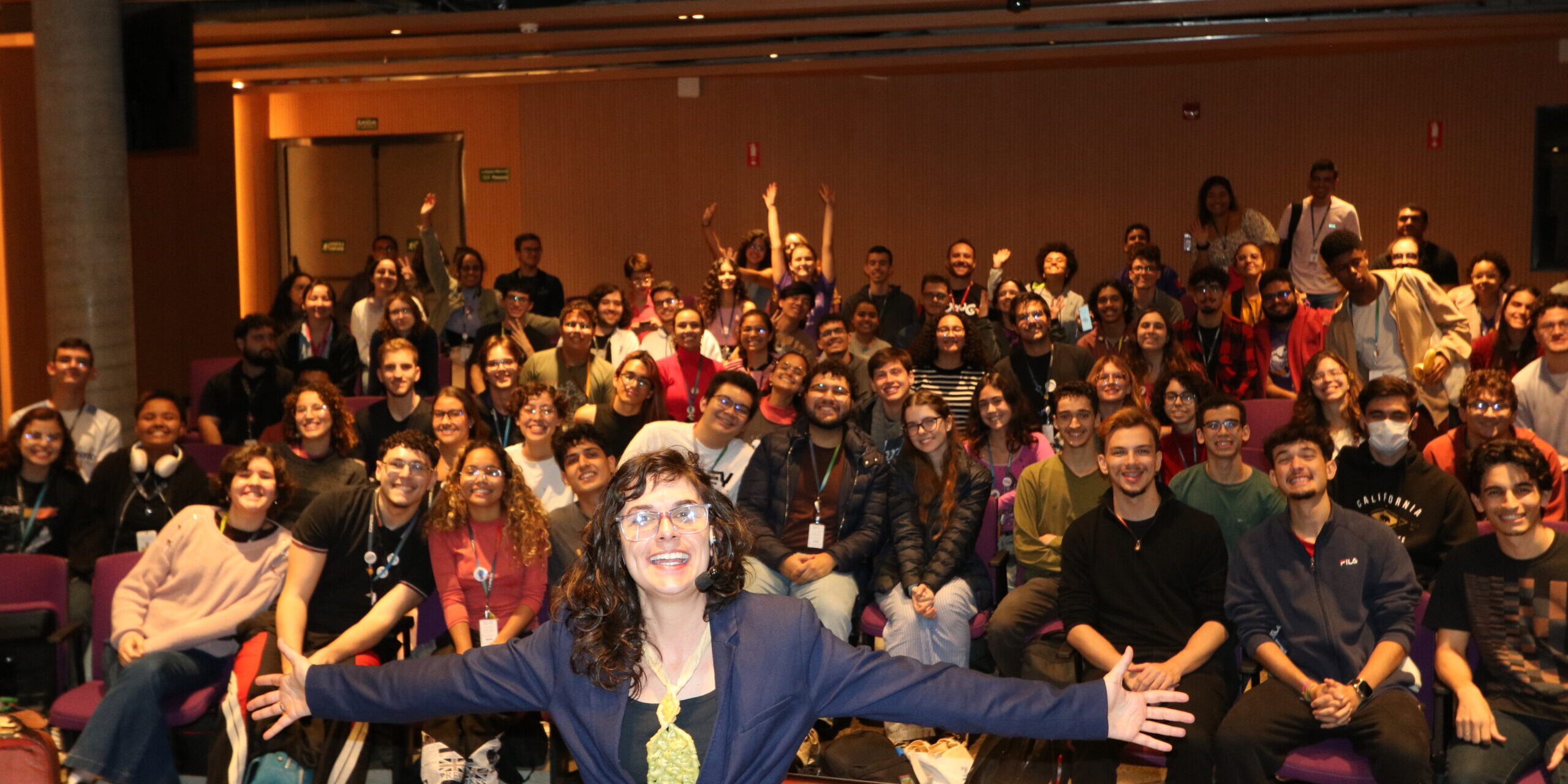The activity complements Humanities classes and brings, in a playful way, important aspects of the role of plastic in the last century
Students from the three classes of the Bachelor’s Degree in Science and Technology at Ilum left the classrooms late Wednesday afternoon, May 14, to take part in a different activity at the School’s Living Center, located at CNPEM: watch a scientific play that discusses a subject directly linked to their education: the role of plastic in our society.
With the title “Plastic, a contemporary myth”, the show, created and performed by Pamella Villanova, provides a historical portrait of the emergence of plastic, its advancement in all spheres of our lives, the benefits and harms, as well as the great current debate of seeking alternatives to control and reduce its consumption and production and dispelling gloomy predictions surrounding the subject.
It takes more than 400 years for plastic to decompose, and it is responsible for the death of 100,000 marine animals per year. It is estimated that by 2050, there will be more plastic than fish in the oceans, according to the United Nations Environment Programme (UNEP). “Plastic structures our daily lives. The game now is to look at how this also structures our culture, our imagination. Trust in this material (plastic) organizes our way of thinking and building our own stories. If plastic is in our imaginary, it is like a myth. So what could we do to overcome this problem of plastic pollution? In the play, plastic is not romanticized, but it is not a villain either”, says the actress, PhD student in Performing Arts at Unicamp and who has been performing this presentation for different audiences for two years now.

Over the course of an hour and a half of the presentation, the audience goes from being concerned about the subject to laughing at Pamella’s light and relaxed performance. The highlight of the interaction between students and the theme was a proposal for them to represent different actors in the plastic-related universe. From the debate emerged abstract ideas, proposed solutions, funny interpretations and a lot of imagination from the entire audience.
“I thought it was wonderful, it was very liberating to have a space to talk about it. It was eductional and showed the importance of talking about this subject”, says Caio Matheus Dantas, second year student at Ilum. For spectators, the activity breaks away from the routine of studies and research that permeates education in the three years of full-time activities. “It’s something different from our day-to-day life. Usually, we watch lectures with content that is very scientific, with dense language. To watch something like this, that transmits knowledge in a light and fun way, in the end it is perhaps more impactful for us”, concludes Caio Marcelo Cavalari Ruas, also a second-year student of the bachelor’s degree in Science and Technology.

One of the axes of Ilum’s pedagogical project includes classes and activities related to Humanities, in which topics such as ethics, culture, Anthropocene and entrepreneurship are studied. The presented play is part of an activities schedule that seeks to relate the scientists’ training with the needs of today’s world. “It’s more than just bringing the topic and raising awareness, which our students already have. The activity brings the language of creativity to think about Science. Today’s world does not allow scientists to be disconnected from contact with society. The language of theater is one of the rich languages that can offer our students the language of creativity”, highlights Ívia Minelli, professor responsible for the Humanities area at Ilum.
About Ilum
Ilum offers a free undergraduate degree program that utilizes an interdisciplinary approach to train scientists and professionals in science and technology. With an innovative educational model, the three-year full-time bachelor program offers courses that connect life sciences, materials science, data science, artificial intelligence, and the humanities in order to prepare researchers to work in an ethical and collaborative manner in the search for solutions to the global challenges of the twenty-first century. The Ilum School of Science is funded by the Brazilian Ministry of Education (MEC) and is part of the Brazilian Center for Research in Energy and Materials (CNPEM) in Campinas, São Paulo, a social organization overseen by the Ministry of Science, Technology, and Innovation (MCTI). Ilum’s educational mission offers early contact with experimental activities, in teaching labs at the school as well as at CNPEM, in projects carried out together with researchers.
About CNPEM
The Brazilian Center for Research in Energy and Materials (CNPEM) is home to a state-of-the-art, multi-user and multidisciplinary scientific environment and works on different fronts within the Brazilian National System for Science, Technology and Innovation. A social organization overseen by the Ministry of Science, Technology and Innovation (MCTI), CNPEM is driven by research that impacts the areas of health, energy, renewable materials, and sustainability. It is responsible for Sirius, the largest assembly of scientific equipment constructed in the country, and is currently constructing Project Orion, a laboratory complex for advanced pathogen research. Highly specialized science and engineering teams, sophisticated infrastructure open to the scientific community, strategic lines of investigation, innovative projects involving the productive sector, and training for researchers and students are the pillars of this institution that is unique in Brazil and able to serve as a bridge between knowledge and innovation. CNPEM’s research and development activities are carried out through its four National Laboratories: Synchrotron Light (LNLS), Biosciences (LNBio), Nanotechnology (LNNano), Biorenewables (LNBR), as well as its Technology Unit (DAT) and the Ilum School of Science — an undergraduate program in Science and Technology supported by the Ministry of Education (MEC).







